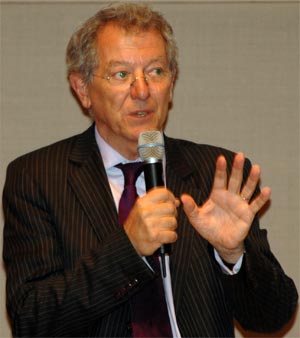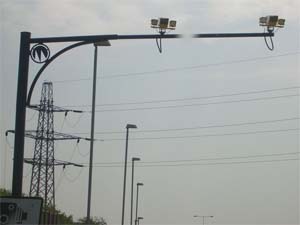 Because
the impending decline in fuel supplies has not been admitted by the
government, public “cognition” of the current price shock has led to
the problem being one of “stealth taxes”. Since the “excuse” for
high fuel tax has been defined as being for the avoidance of global
warming, climate change has itself been denied.
Because
the impending decline in fuel supplies has not been admitted by the
government, public “cognition” of the current price shock has led to
the problem being one of “stealth taxes”. Since the “excuse” for
high fuel tax has been defined as being for the avoidance of global
warming, climate change has itself been denied.
This means that the inevitable fuel protests will continue and taxes will be reduced. It is too late for the government now to admit that its plans for roads and runways are ill advised; the public’s “cognitive dissonance” will dismiss the peak oil prophesies as “doom-mongering”.
"Cognitive dissonance (according to Wikipedia) is similar to ambivalence and describes conflicting thoughts or beliefs (cognitions) that occur at the same time. It can be the filtering of information that conflicts with what one already believes, in an effort to ignore that information and reinforce one's beliefs.
This "irrational inability to incorporate rational information" is perhaps the most common perception of cognitive dissonance." (Tavrin and Aronson)
Uranium supply
 On
a BBC Radio 4 Today programme broadcast on 29 May 2008, joint
author Carol Tavrin was interviewed by Evan Davis, when she introduced
the concept of cognitive dissonance. The next item was a
discussion with Sir David King, once Chief Scientist of the Blair
government. He is an apostle of the nuclear "renaissance",
being a strong advocate of nuclear power as providing security of
supply, while offering a relatively carbon-free form of electricity
generation.
On
a BBC Radio 4 Today programme broadcast on 29 May 2008, joint
author Carol Tavrin was interviewed by Evan Davis, when she introduced
the concept of cognitive dissonance. The next item was a
discussion with Sir David King, once Chief Scientist of the Blair
government. He is an apostle of the nuclear "renaissance",
being a strong advocate of nuclear power as providing security of
supply, while offering a relatively carbon-free form of electricity
generation.
As the UK has no uranium mines and relies on imported fuel for its nuclear generation, most likely in future from the French nuclear plant builder Areva, his cognition of security of supply is matched by an opposing cognition that uranium mining, which in any case only provides 60% of the demand, is in decline. Moreover, the other 40% from so-called secondary supplies is expected to run down to a very little by 2013.
To avoid this dissonance, in his interview, he claims that "there is plenty of uranium in this country". Others in the nuclear fraternity have joined him in arguing that the UK's inventory of uranium in spent fuel (residing in cooling ponds), in enrichment tails and depleted uranium (stored in gas cylinders as uranium hexafluoride) represents a valuable source of fuel. At Sellafield some of the spent fuel elements have been dissolved in acid and the plutonium separated out to make a mixed oxide fuel (MOX) with some of the recycled uranium.
 The
Nuclear Decommissioning Authority (NDA), which owns Sellafield, has
assessed the fuel able to be made from its uranium and plutonium
inventory as able to supply 3 one gigawatt reactors for their lifetime,
albeit only 15% of the fuel requirement of the anticipated expansion.
However, even this moderate contribution is subject to massive capital
expenditure in plant and in running costs at Sellafield. Additional
equipment would be required, including enrichment gas centrifuges, which
would be more relevantly employed in making better use of declining
natural uranium supplies.
The
Nuclear Decommissioning Authority (NDA), which owns Sellafield, has
assessed the fuel able to be made from its uranium and plutonium
inventory as able to supply 3 one gigawatt reactors for their lifetime,
albeit only 15% of the fuel requirement of the anticipated expansion.
However, even this moderate contribution is subject to massive capital
expenditure in plant and in running costs at Sellafield. Additional
equipment would be required, including enrichment gas centrifuges, which
would be more relevantly employed in making better use of declining
natural uranium supplies.
The nuclear agencies claim that a rise in the price of uranium will allow the economic opening of new mines with low ore grades, thus extending the reserves. Rather than support this commonly stated industry defence, Sir David has instead "compelled his mind to acquire new thoughts or beliefs" in defending his advocacy of nuclear power and in so doing provided an example of cognitive dissonance in action.
Car use and peak oil
The UK Department of Transport collectively exhibits cognitive dissonance in its policies on roads.
 The
rapid rise in prices of petrol and diesel has led to demands that fuel
tax be cut and will probably mean that future upward adjustments will be
abandoned. Until now it has been generally accepted that adding lanes to
motorways attracts more traffic until it is once more congested, while
the road works in the interim add to the frustration. It remains to be
seen how high the fuel prices have to rise to have a marked effect on
road use. It is likely that in the prosperous urban areas the costs will
be absorbed, while in rural areas use will decrease as journeys will
await an accumulation of needs.
The
rapid rise in prices of petrol and diesel has led to demands that fuel
tax be cut and will probably mean that future upward adjustments will be
abandoned. Until now it has been generally accepted that adding lanes to
motorways attracts more traffic until it is once more congested, while
the road works in the interim add to the frustration. It remains to be
seen how high the fuel prices have to rise to have a marked effect on
road use. It is likely that in the prosperous urban areas the costs will
be absorbed, while in rural areas use will decrease as journeys will
await an accumulation of needs.
Two reports, the RAC’s "Roads and Reality" in December 2007 (RAC Foundation 2007) and the government’s "The Eddington Transport study" (Eddington 2006) argue strongly for more investment in roads together with road pricing. Neither report considered the effect of peak oil on road use or any actual shortage of fuel. The reports examined the effects of increased road traffic on climate change and while improved engine efficiencies, alternative fuels and means of propulsion were discussed, the only restriction on use was by road pricing and possibly fuel taxation.
Even before the recent price escalation, new registrations of cars peaked in 2003 at 2,563,631 falling to 2,344,864 in 2006 (SMMT 2007), which is a quite significant reduction of 9.1%. Undoubtedly, the fall in new car purchases reflects the growing congestion and lack of capacity on some roads. So even without the effect of rising fuel prices, car manufacturing in and for the UK is in decline.
Global crude oil production has been flat, sustained by the contribution of synthetic crude oil from tarsands and other non-conventional sources; but the underlying trend is for the production of conventional oil to decline having passed its peak. Although pump prices have soared, there has been sufficient supply. Once the aggregate of all the supplies declines, the rich nations will maintain their supplies at the expense of the poor nations by paying more, but then competition for supplies between them will inevitably lead to shortages and priority allocations.
Cognitive dissonance “is often associated with the tendency for people to resist information that they don't want to think about, because if they did it would create such dissonance, and perhaps require them to act in ways that depart from their comfortable habits.”
 The
government has refused to admit the onset of peak oil, even though the
situation in the North Sea fields provides a classic illustration of the
phenomenon. It means the progressive emptying of the roads and the
collapse of the motor industry, currently employing over 500,000 people.
Perversely, it has advocated road pricing and has authorised more
expenditure in road building, in effect, denying a supply problem, while
embracing problems of congestion, that can be but temporary.
The
government has refused to admit the onset of peak oil, even though the
situation in the North Sea fields provides a classic illustration of the
phenomenon. It means the progressive emptying of the roads and the
collapse of the motor industry, currently employing over 500,000 people.
Perversely, it has advocated road pricing and has authorised more
expenditure in road building, in effect, denying a supply problem, while
embracing problems of congestion, that can be but temporary.
Instead, the government has “acquired or invented new thoughts or beliefs” in the current concern with climate change, which provides a convenient excuse for reducing fuel combustion and associated emissions, without admitting the inevitability of a shrinking usage of fossil fuels.
Air traffic and peak oil
Copies of the piece “Flight-Path Britain” (Busby 2007) published in Real Resources Review have been sent to the government agencies concerned and to the media, but it has failed to elicit a response. It has been presented and submitted as evidence to the Stansted Airport expansion public inquiry, which has yet to report, and will be sent to the forthcoming inquiry into a second runway.
It shows that if the ASPO peak oil plots, which appear in successive editions of its newsletter (ASPO), prove to be real, then air passenger and freight traffic will decline, so that no more runways are required. Meanwhile, the decline is already underway with mergers, bankruptcies and grounded aircraft. But so far, there is no sign of the government admitting that the expansion of Heathrow (leading to the destruction of whole communities and causing misery to millions living in West London) is unnecessary.
 Heathrow
is served by a vast road infrastructure, so that the shortage of motor
fuel and of jet fuel will have a double impact on its activity. The new
Terminal 5 will probably be sufficient to serve the residual business in
a few years time and the terminals due to be demolished need not be
rebuilt.
Heathrow
is served by a vast road infrastructure, so that the shortage of motor
fuel and of jet fuel will have a double impact on its activity. The new
Terminal 5 will probably be sufficient to serve the residual business in
a few years time and the terminals due to be demolished need not be
rebuilt.
Cognitive dissonance “can be the filtering of information that conflicts with what one already believes, in an effort to ignore that information”. In the case of air traffic, the reduction in activity will mean the cancelling of orders for new, more efficient aircraft. The UK has joined with Europe in subsidising Airbus with state loans in order to secure the jobs at Broughton in North Wales. Without new runways there will be no space for increased traffic; so without the expansion envisaged, Airbus will collapse and with it the loans which will be written off. The peak oil “information” has to be ignored.
Public cognition
Because the impending decline in fuel supplies has not been admitted by the government, public “cognition” of the current price shock has led to the problem being one of “stealth taxes”. Since the “excuse” for high fuel tax has been defined as being for the avoidance of global warming, climate change has itself been denied.
This means that the inevitable fuel protests will continue and taxes will be reduced. It is too late for the government now to admit that its plans for roads and runways are ill advised; the public’s “cognitive dissonance” will dismiss the peak oil prophesies as “doom-mongering”.
It was clear in the aftermath of the year 2000 fuel protests that a change in lifestyle was needed. An opportunity was lost to instill a change of economic direction and the then new government failed to embrace its opportunity to bring in an energy lean society.
However there is a nascent Transition Towns movement (Hopkins 2008), initiated in Kinsale in Ireland, then in Totnes in Devon and now spreading to include Lewes in Sussex and Lampeter in Wales advocating and creating the revised lifestyle.
It needs both public and government re“cognition”.
Sources
ASPO (Association for the Study of Peak Oil) http://www.peakoil.net/
Specifically: http://www.aspo-ireland.org/index.cfm/page/newsletter
Busby, John. 2007. “Flight-Path
Britain”
Eddington, Sir Rod. 2006. The
Eddington Transport Study .
Hopkins, Ron 2008. The Transition Handbook. Green Books.
RAC Foundation 2007. Roads
and Reality.
SMMT (The Society of Motor Manufacturers & Traders Ltd) 2007.
Tavris, Carol and Aronson, Elliot. 2007. “Mistakes were made (but not by me)” . Harcourt